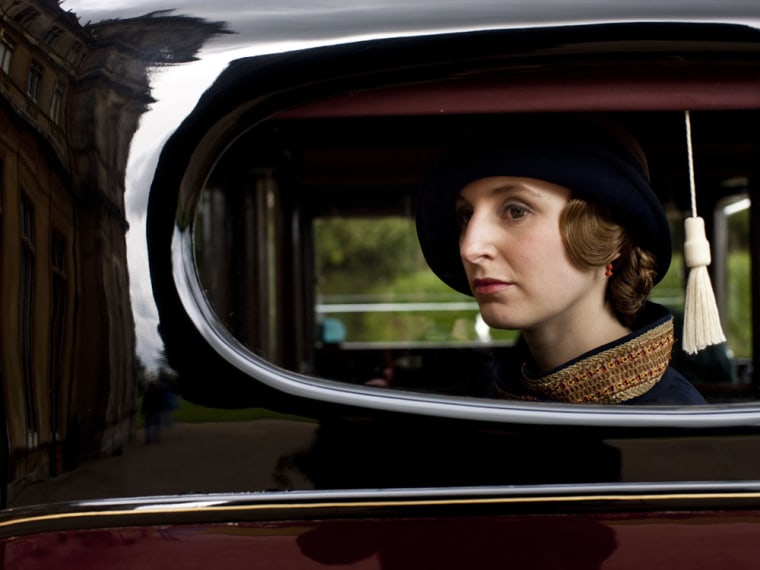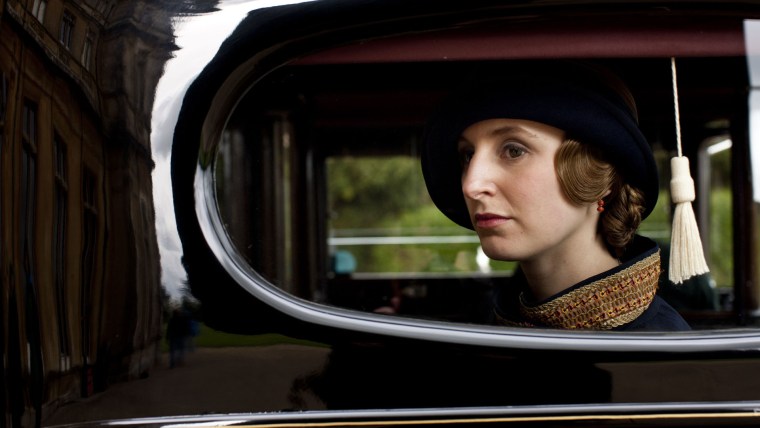
If you dare to have premarital sex on "Downton Abbey," you better be prepared for the consequences — from unwanted pregnancy and prostitution to death.
These are the punishments meted out by creator and writer Julian Fellowes upon the licentious ladies who indulge their sexual appetites before marrying, and Lady Edith on Sunday became the latest victim of his pen.
How much of this is an accurate depiction of the post-Edwardian versus plain ol' harlot shaming by the "Downton" scribe?
"The case of an aristocratic woman like Lady Edith getting pregnant, especially in adulthood, undoubtedly happened, but would have been exceedingly shocking if it became common knowledge," British historian Stephen Hague told TODAY. "Sex outside of marriage — at least for women who had never married — was shocking enough, but to get pregnant as well was doubly so."
Edith finally explored her love for Michael Gregson, and look where she landed: pregnant and alone.
Fans will find out in the coming weeks whether Gregson returns from Germany with a divorce decree and some baby booties, but historically, Edith's options would have been slim.
"Abortions would have been available and safer (for upper-class women like Edith) than for other classes, but still quite dangerous," said Hague, who hosts a weekly "Downton Abbey" panel at New Jersey's Rowan University. Interestingly, he noted, "Even many women’s right advocates and suffragettes" — like Edith and her sister Sybil — "had opposed abortion, not out of concern for the fetus but because of the threat to a mother’s health and the sense that available abortion would make it more likely for men to continue to dominate women."
Another option available to Edith would be to join Michael in Germany — if she can find him —and "live as man and wife, away from the omnipresent eyes of British society," offered Hague.
Raising the child herself "would have been almost unthinkable," he said. "Even in the 1920s, (Edith's pregnancy) would likely have resulted in being cast aside by her family and being left to fend for herself, or possibly being essentially locked away in the country house or elsewhere not really to be talked of."
Of course, it could be argued that Edith has been living this way for a while, with Mary stealing all her suitors. What a bitter irony that Edith once threatened her sister with the same ruin she is now facing herself.
When the virgin Mary invited a man into her boudoir in the first season, only one of them walked out alive. One would say Mr. Pamuk paid the ultimate price, but think of Mary's reputation!
"Engaging in premarital sex before the war would have been highly frowned upon," Hague said about their liaison. "Had it become widely known, Lady Mary would have faced substantial social ostracism." Those Crawleys who did discover the truth, he noted, "expressed shock but little more, and the actual consequences would likely have been even more severe for an aristocratic daughter."
Few aristocratic women of the era would have been as brazen as Mary — or even know what to expect in the bedroom. "Before the war, sexuality was primarily discussed by intellectuals, socialists and feminists — none of whom were well-regarded by the aristocracy," Hague noted. "As a result, young women like Lady Mary Crawley for the most part had little knowledge about sex and the sexual act. The episode with Mr. Pamuk is great drama but would have been highly unusual."
Even if Mary Stopes' influential 1918 book "Married Love" — which the scheming maid Edna consulted to prevent pregnancy with Tom Branson — had been available to both Crawley sisters, "it is unlikely that (they) would have read it," Hague pointed out. "Although there were moves toward sexual freedom, the general rule for the upper class was awareness about sex and childbirth was fairly limited, not talked about, and even unsavory."
"Married Love" was published too late to benefit the Crawleys' maid Ethel, who was sacked after being caught with a wounded soldier in season two. When she became pregnant, the cad refused her, and she ultimately resorted to prostitution to support their child. Even though she was eventually rescued by Downton's do-gooders, Ethel's dalliance cost her dearly.
Here's hoping Lady Rose, Downton's rebellious new debutante, has been paying attention.
"Some girls did increasingly circumvent the rules," Hague said of Rose's "hedonistic 1920s attitude." A flirty flapper is one thing, but if Rose goes too far, she'll lose a lot more than her bloom.
